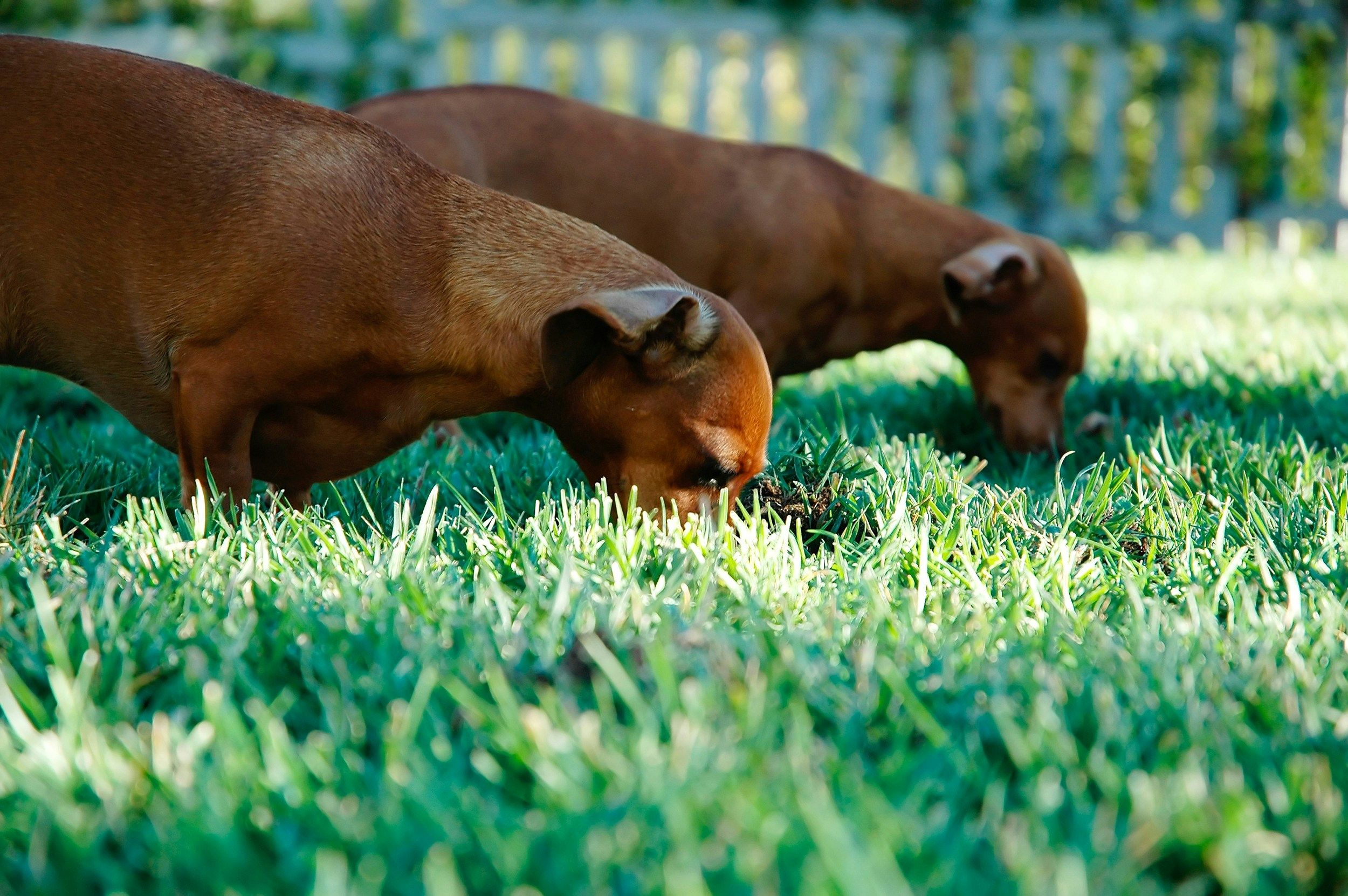If you've ever taken your dog for a walk and watched them suddenly start eating grass, you might have wondered why they do this. It can be confusing for many pet owners. However, knowing why dogs behave this way can help you understand their health and instincts. Here’s a closer look at why dogs eat grass and what it means for their well-being.
Reasons Why Dogs Eat Grass
- Instinctual Behavior: One of the primary reasons dogs may eat grass can be traced back to their wild ancestors. Dogs are descendants of wolves, which often consumed herbivorous prey that included the contents of their stomachs that were rich in plant material. This behavior shows that dogs may have evolved to eat plants. This means that eating grass could be a natural habit from their foraging days.
- Dietary Needs: Another reason dogs might seek out grass is to supplement their diet. Grass contains certain nutrients and fiber that can support digestion. If a dog is lacking in specific vitamins or fiber in their diet, they might turn to grass to help fulfill those nutritional needs. If your dog frequently eats grass, it may be beneficial to evaluate their diet to ensure they receive all the necessary nutrients.
- Upset Stomach: Many dogs seem to eat grass when they feel nauseous or have an upset stomach. For some, eating grass may induce vomiting, which provides a sense of relief from discomfort. However, it's essential to note that not all dogs vomit after eating grass, and excessive grass eating could lead to intestinal blockages, which can be serious.
- Boredom or Anxiety: Just like humans may snack due to boredom, dogs may eat grass to cope with anxiety or boredom. If your dog is not getting enough physical exercise or mental stimulation, they may turn to grass as a form of entertainment. Engaging them with regular exercise, playtime, and interactive toys can help reduce this behavior.
- Taste and Texture: Sometimes, dogs eat grass simply because they enjoy it! Dogs are naturally curious and explore their world using their senses, including taste. Different types of grass can have varying textures and flavors that may be appealing to your pooch, making it an enticing snack.
- Habit: For some dogs, eating grass can become a habit. If they’ve previously enjoyed eating grass without negative consequences, they may continue to do so as part of their routine. Dogs are creatures of habit, and routine behaviors can become comfortable and familiar.
- Pica: Sometimes, dogs eat grass because of a condition called pica. This condition involves eating non-food items. Pica can stem from dietary deficiencies or can be linked to certain medical conditions. If you suspect your dog may have pica or a diet deficiency, it’s wise to consult your veterinarian.
Should You Be Concerned If Your Dog Eats Grass?
Occasional grass eating is typically normal and harmless. However, if your dog frequently grazes or shows signs of distress afterward, it's a good idea to consult a veterinarian. Ensure that the grass they eat is free from harmful chemicals like pesticides or fertilizers, as these can pose health risks to your pet.
Why Did My Dog Eat Grass and Then Throw It Up?
Dogs may eat grass for various reasons, such as to soothe an upset stomach or simply because they find it tasty. However, eating grass can cause dogs to vomit, which can be concerning for pet owners. In most cases, dogs will eat grass to make themselves vomit when they are feeling unwell or to alleviate digestive discomfort.
When a dog eats grass, it can cause irritation to their stomach lining, which triggers the vomiting reflex. Vomiting helps the dog get rid of grass and other things that may cause discomfort or irritation. Additionally, eating large amounts of grass can cause a blockage in the digestive system, which can also lead to vomiting.
If your dog vomits after eating grass, it’s important to monitor them closely and ensure that they are drinking plenty of water to stay hydrated. If the vomiting continues or comes with other symptoms like diarrhea or tiredness, it’s best to see a vet. This will help check for any health problems. In some cases, vomiting can be a sign of a more serious condition, such as gastroenteritis or pancreatitis, which may require medical treatment.
Why Did My Dog Eat Grass and Not Throw Up?
Many people believe that dogs eat grass to induce vomiting due to nausea, gastrointestinal upset, or intestinal parasites. However, studies show that fewer than 25% of dogs vomit after eating grass, and only about 10% show any signs of illness beforehand.
In most cases, grass eating appears to be a normal behavior rather than a symptom of an underlying issue. Still, if your dog is eating grass frequently or excessively, or if you notice vomiting, diarrhea, or changes in appetite, it's a good idea to consult your veterinarian to rule out any medical concerns.
Can Eating Grass Be Harmful or Poisonous To My Dog?
Eating grass is not inherently toxic to dogs, but it can become dangerous depending on what's on or in the grass. Lawns treated with pesticides, herbicides, or chemical fertilizers can pose a serious poisoning risk. Additionally, grass contaminated with parasite eggs, such as roundworms or hookworms, from the feces of other animals can expose your dog to intestinal parasites. These infections may lead to malnutrition, weight loss, or diarrhea.
Grass is also indigestible. If your dog consumes a large amount at once, it can increase the risk of a life-threatening intestinal blockage. Always supervise your dog when outdoors, ensure that any grass they have access to is untreated, and consult your veterinarian if they eat grass frequently or show signs of illness.
What Should I Feed My Dog If She Keeps Eating Grass Due to Lack of Dietary Fiber?
If your dog frequently eats grass, it may help to increase their dietary fiber. Adding dog-safe vegetables such as steamed green beans, carrots, or spinach can provide a healthy fiber boost. You can also talk to your veterinarian about using a fiber supplement if needed.
Evaluate your dog’s current food and consider switching to a high-quality, AAFCO-certified diet that is rich in fiber and balanced in nutrients. Sometimes, grass eating can be a sign that a pet’s nutritional needs aren’t being fully met. Lastly, make sure your dog always has access to fresh, clean water, as dehydration can also contribute to unusual eating habits.
Is it OK to Let Your Dog Eat Grass?
For the most part, it is OK to let your dog eat grass occasionally. It’s best to keep them on grass in your yard. This way, you can be sure it is free from harmful chemicals like pesticides and herbicides. It’s also not a good idea to let your dog eat a lot of grass at one time, as doing this can make them sick.
Should You Take Your Dog to the Vet for Eating Grass?
Eating grass is a fairly normal, instinctual behavior in dogs. However, it may be a good idea to see a vet in a few instances of eating grass. It’s a good idea to talk to your vet about your dog’s grass eating habits if:
- You suspect that there is something wrong with your dog’s diet (lack of fiber, vitamins and minerals, etc.)
- Your dog is vomiting or has diarrhea
- Your dog is showing any other symptoms of illness
- Your dog is showing signs of having a medical condition
- Your dog has just eaten a lot of grass at one time
- You suspect that your dog has eaten grass with a toxic treatment on it (pesticides, herbicides, etc.)
Understanding Why Dogs Eat Grass Can Help Better Explain Your Pup's Behavior
Dogs eat grass for various reasons, including instinctual behavior, dietary needs, nausea relief, boredom, taste, and habit. As a dog owner, understanding this behavior can help you determine if it’s just a quirky habit or something more concerning. You should always monitor your pet's health and behaviors, and you should reach out to veterinarian if you have concerns. Keeping your dog's diet balanced and ensuring they receive plenty of exercise and mental stimulation can help minimize unwanted snacking. If you are concerned about your dog's grass eating habit, the doctors at Ruby Veterinary Urgent Care can evaluate and treat any underlying issues.

